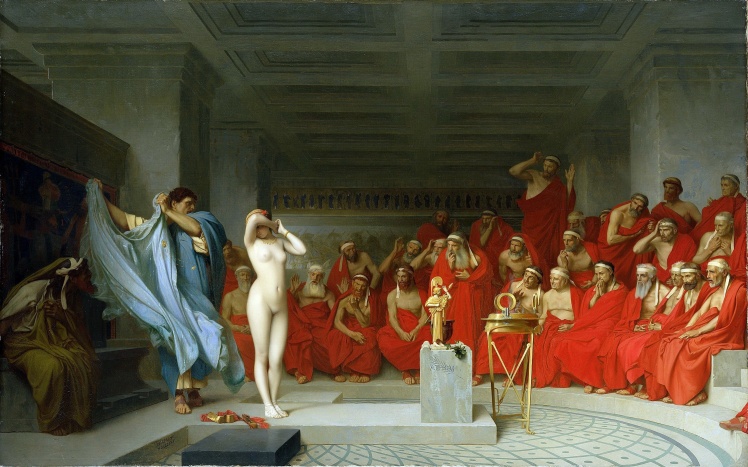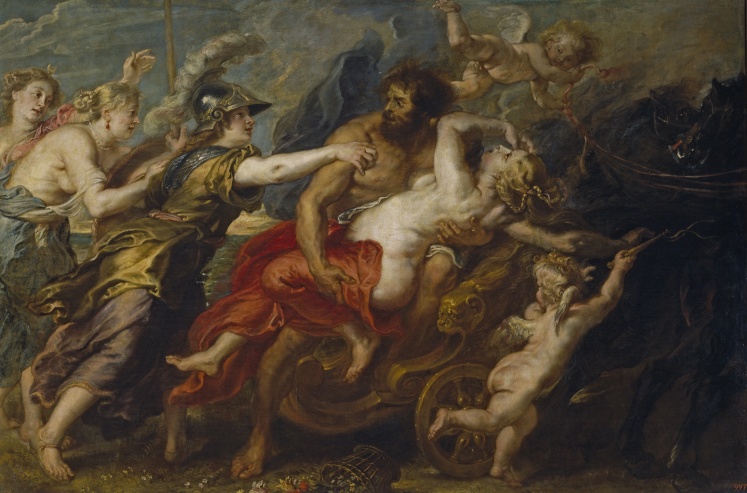
The Rape of Proserpina, Hans von Aachen [Public domain], via Wikimedia Commons
“Rape Culture is an environment in which rape is prevalent and in which sexual violence against women is normalized and excused in the media and popular culture.” – Marshall University Women’s Center
While it may not have been referred to as such at the time, the misogynistic culture of Ancient Greece certainly qualifies under rape culture. Our sources (most of them Athenian) paint a picture of a society in which women did not have full access to consensual sexual relations. Laws maintained a second-class citizenship under which a culture of rape was allowed to fester. Pop culture, contemporary writings, and myths paint a picture in which the trauma of marriage and sex was acknowledged, but also in which subordination was expected and fetishized nonetheless.
Women Under the Law
Looking at the laws in Athens, we can see the institutionalized inequality. Women “could not bring cases… and could not appear before the court or even give evidence in any direct way” (Omitowoju 17). Wives were expected to remain inside (excepting festivals, funerals, and weddings), and it was illegal for them to “make important social and financial decisions without the supervision of a guardian” (Fantham et al. 72, 79). This means that any case, rape included, would need to be filtered through the men in her life, giving him power to decide what had happened, how to present it, and what to seek in recompense. This would be a second-hand account, and would mean that justice was being sought, at best, on behalf of the woman wronged, if not entirely for her guardian.

Phryne before the Areopagus, Jean-Léon Gérôme [Public domain], via Wikimedia Commons
Punishment for Rape vs Adultery
While it’s agreed that rape was looked upon as a bad thing, exactly how heinous it was remains up for debate, particularly in relation to what we would loosely refer to today as adultery. The term in question, moicheia, is something that happens to the woman, and has been taken to mean either sex with any woman under the guardianship of another man, or specifically an act that violates the marriage contract (Carey 408). This has often been framed as an act that was considered worse than rape, as in the 4th century trial of Euphiletus, a man who had murdered his wife’s lover after discovering him committing moicheia. He put forth that the law “considered violators deserving of a lesser penalty than seducers: for the latter he provided the death penalty; for the former, the doubled fine,” (Lysias, On the Murder of Eratosthenes 32).
He is at least partially corroborated by the Gortyn Law Code in Crete, which also prescribes fines as punishment for rape (Inscriptiones Creticae 4.72, cols. ii.3-27). This was a punishment that did not directly benefit the victim, but instead paid restitution to her guardian, placing her in a social position near to property, rather than as a human in her own right. The greater crime in this interpretation is that another man has entered the household, not that a woman has potentially been hurt and traumatized, creating a hierarchy of crime and victims. The concern of the law here is that the legitimacy of children has been undermined, as well as the wife’s loyalty to her husband. The potential victim herself is pushed aside in favor of the stability of the household and the multiple people living in it.
Another perspective holds that both moicheia and rape were considered equally, if not differently, illegal. It is possible that punishment for rape fell under the laws against hubris, which would have constituted “behavior carried out with the intent to dishonor and taking pleasure in doing so” (Omitowoju 32). Like the punishment for moicheia, an act of hubris could possibly warrant death, but “whether or not an action was judged to be hubris depended less on the offense than on an individual’s interpretation of that action” (Lape 86). If the woman could not bring her case or defense directly to court, then her guardian could decide how to interpret the event, whether she was complicit, and what wrongs were being committed against the household. An act of rape, then, could be instead interpreted as moicheia, depending entirely on the benevolence of the husband or father. In either model, the consent of the woman is relative to the situation and people at hand, and irrelevant to the culture at large.

The Rape of Proserpina, Peter Paul Rubens [Public domain], via Wikimedia Commons
Popular Culture
Rape under Athenian law assumed it as a physically violent act against another person, with the punishment ranging anywhere from a fine to possibly death. Even if the definition was narrow, what did fall into that category was certainly a crime. However, there may have been some instances when the illegality of rape had wiggle room. Some playwrights, such as Menander and his contemporaries, utilize rape in much more casual, comedic situations. These plays typically focus on “normalizing and resolving the consequences of the rape by uniting the rapist and victim in marriage, or uncovering the fact that the rapist has unknowingly already married his victim” (Lape 79). This contrasts very drastically with the law, and suggests that there are some circumstances under which it is understandable, if not outright acceptable, that a woman would be raped. In fact, the common denominator in the comedies seems to be “a potent combination of youth, passion, and alcohol,” employed within the context of festivals specifically to “decriminalize the rape” (Lape 94). And rape it is, as in Menander’s Epitrepontes, where the girl is described as “weeping and tearing her hair,” with her cloak “torn to rags” (Omitowujo 173). This is an action clearly against the woman’s will, but the festival setting, and the inebriated state of the rapist, are presented so that the act moves from the illegal into the relatively mundane. The fact that she is later (unknowingly) married to her rapist moves the act into the comedic trope mentioned above. It shows that men, under certain circumstances, are allowed to be caught up in the moment, with the consequences being morally akin to those of any other daily happenstance.
Other quotes from contemporary literature and popular culture show that violence against women and rape fell well within the norm, both in and out of the household:
“If against my will he takes me by force… I’ll be a lousy lay” (Ar. Lys. 246-249).
In Aristophanes’ play Lysistrata, the wives of Greece go on a sex strike to force their husbands to end the Peloponnesian War. In their oath to one another, they treat rape as a real possibility, but gloss over any seriousness by describing resistance as merely being a “lousy lay.” Subordination is treated as an inevitability.
“A man cannot stop her by threatening, nor by losing his temper and knocking out her teeth with a stone” (Semonides, On Women 18-19).
Semonides used animal metaphors to describe types of wives a man could end up with, many of them negative. Here he suggests that some women are resistant to or deserve violence, setting up a picture of home life in which the needs and desires of the husband are not to be resisted.
“I said no more, but took the girl and laid her down amidst the blooming flowers, covering her [body] with a soft [cloak] and encircling her neck with my arms, while she [fell silent in fear] like a fawn [before a wolf?]. Then gently I touched her [breasts] with my hands, and she revealed a part of her young flesh, the harbinger of her prime. And caressing her beautiful body [all] round I released the [white] life-force, lightly touching her fair [hair]” (Archilochus, P.Colon. inv. 7511).
Prior to this act, the girl has already stated her “no.” The poet pushes past this, coercing her with compliments until she gives in. The language here also suggests great fear on the part of the girl.
“Your wife should be four years past puberty and be married to you in the fifth. Marry a virgin, so you can teach her good habits” (Hesiod, Works and Days, 695-705).
“…she wasn’t fifteen years old when she came to me, and in the time before that she had lived such a protected life that she saw and heard as little as possible…” (Xenophon, Oeconomicus 7.5).
The two quotes show that women were married young so that they may be trained up by their husbands. This presents a sort of brainwashing, where the wife is intended to be an empty vessel, into which her husband can pour whatever values he desires. There was the option of divorce, but such an act would require either the wife appearing in public before the archon, as well as the cooperation of the courts, or it could be initiated by her father, in which case she would return to his home (Cohn-Haft 4-7). Both instances require the final judgment of men to decide that a situation was dire enough that the wife could leave her husband.
Mythology
The religion of Ancient Greece shows us that consent was not a necessity in the marriage bed. In the story of Persephone and Hades, the young girl is kidnapped by her uncle to be his wife (Homeric Hymn to Demeter, verses 370-95). Zeus had promised his daughter “in marriage to his brother Hades without the permission (and here even the knowledge) of either mother or daughter” (Fantham et al. 27). What results is a terrifying allegory for a girl leaving the home of her parents for the home of her husband.
The story has in fact been put forth as a “description of a woman’s initiation,” a symbolic story of a young girl entering womanhood (Lincoln 223). Though a kidnapping is clearly not a situation in which anybody could consent to sexual relations, Persephone’s subsequent marriage is upheld. Mythology, reflecting the culture in which it existed, leaves the final say in the marriage to Persephone’s father, Zeus. Hades’ abduction of the girl, and her resistance, point to an acknowledgment of fear on the part of any young woman going into marriage. However, that fear is treated as a fact of life, and something to be overcome, rather than a flaw in the system.
(Rape is a recurring theme in many other myths as well, though many stories are from later Roman sources and it can be difficult to directly relate them to contemporary Greek society. Theoi has a good compendium of sourced myths for further reading.)

A Spartan Woman Giving a Shield to Her Son, Jean-Jacques-François Le Barbier [Public domain], via Wikimedia Commons
Consent in Sparta
While the sources on Sparta are spread out, and rarely from within the city-state themselves, they agree that Spartan women were encouraged to be outside the home, and to participate in physical education (Fantham et al. 62). However, this did not eliminate instances of what would be considered rape. The first example is in the marriage ritual, in which Plutarch describes how “men married the girls by kidnapping them” (Plutarch, Life of Lycurgus 15.3). As Plutarch was writing in the 2nd century CE, the veracity of this specific event is hard to corroborate without sources from inside Sparta itself. There’s also no mention if this was intended to be a ritualized “kidnapping,” or if women were plucked randomly off the street. If this was the case, however, the kidnapping of women is hardly a consensual method. Even ritualized, the symbolism is, at best, questionable in its motivations.
The second Spartan example is more legal in nature. Xenophon, an Athenian writing in the 4th century BCE, states that an older man could choose a younger man to provide healthier children with the former’s wife, and that a husband desiring “worthy children” could seek them with another woman, providing he persuaded her husband first (Xenophon, Constitution of the Lacedaemonians 1.7-8). A problem arises with this source as well, as Xenophon was not from Sparta, and his information was certainly second-hand. The lack of the wife’s consent in these two instances could very well have been part of Spartan law, which is to say that the consent was unimportant. Or, the absence could reflect the Athenian indifference to a wife’s consent in marriage, transposed onto the Spartans. The evidence, unfortunately, is shaky. That said, it remains unlikely that a single city-state was able to eliminate rape wholesale. As a culture that valued healthy children as a contribution to society, resistance in Sparta could be viewed as deviance.




